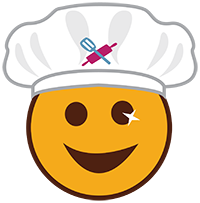Honey-Lemon Butter

Fun-Da-Mentals Kitchen Skills
- pinch :
to squeeze with two fingers to break off small pieces of a fresh herb or to collect a tiny measurement of a dried herb or spice.
- pour :
to cause liquid, granules, or powder to stream from one container into another.
- shake :
to rapidly and vigorously move a covered container filled with food up and down and side to side to combine ingredients and create a different consistency, such as shaking whipped cream to make butter.
- squeeze :
to firmly press or twist a food with fingers, hands, or a device to remove its liquid, like shredded potatoes, frozen and thawed spinach, or tofu.
- zest :
to scrape off the outer colored part of a citrus fruit's rind (skin or peel) using a metal tool with small sharp blades, such as a zester, microplane, or the small holes of a grater (avoid the "pith," the white, spongy lining of the rind that can be bitter).
Equipment Checklist
- Zester (or grater with small zesting plate/side)
- Cutting board + kid-safe knife
- Citrus juicer (optional)
- Small bowls
- Liquid measuring cup
- Plastic container + tight-fitting lid
Ingredients
Honey-Lemon Butter
- 1/2 pint (8 oz) whipping cream, room temperature (sub softened dairy-free butter, like Earth Balance)
- 1 pinch salt
- 1 squeeze lemon juice
- 1 pinch lemon zest
- 1 T honey
Food Allergen Substitutions
Honey-Lemon Butter
- Dairy: Substitute softened dairy-free butter for Whipped Butter and mix in honey, lemon zest, and lemon juice.
Instructions
Honey-Lemon Butter
zest + squeeze
Zest 1 lemon and then cut the lemon in half and squeeze out the juice. Set both to the side. (You will use these in both the butter and milkshakes.)
pour + pinch + shake
Pour 1/2 pint of whipping cream into a plastic container with a tight-fitting lid. Add 1 pinch of salt. Cover tightly with lid and then shake, shake, shake, until the cream becomes butter! When the cream stops moving in the container, you are almost there—keep shaking! When you hear a thunk and a slosh, you've made butter!
drain + stir
Drain off the excess liquid (the buttermilk). Stir in 1 pinch of lemon zest, a squeeze of lemon juice, and 1 tablespoon of honey.

Hi! I'm Honey!
"I'm a golden, thick, naturally sweet liquid made by honeybees! My flavor varies depending on the particular flower nectar that bees carry home to their hive. Did you know I can last indefinitely? That's forever! Try squeezing or dribbling me into tea, on biscuits, toast, or fruit, and add me to desserts."
- Honeybees make honey—they are one of the world's insects that makes food people can eat. An average bee makes about one-twelfth of a teaspoon of honey during its whole life.
- In Spain, an 8,000-year-old cave painting in the Cuevas de la Araña (Spider Caves) depicts a person gathering honey from a beehive.
- Egyptian hieroglyphs record the practice of beekeeping in ancient Egypt and honey's use as a sweetener and as a soothing ointment for wounds. Egyptians also buried their dead with honey or used it in mummification.
- Ancient Greece had its beekeepers, and references to honey also appear in ancient Indian and Israelite texts.
- Honey has an indefinite shelf life—it can last forever if well stored because it has natural preservatives. It may crystallize eventually, but the crystals will melt if you warm it by putting the jar in a bowl or pot of hot water or in the microwave on low power.
- People initially used honey as a culinary sweetener but now recognize it as a healing ingredient in medicinal treatment. For example, honey can help soothe a cough or sore throat and heal burns or cuts on your skin.
- Eating local honey, made from bees living in the same area where you live, may help you build up a resistance to pollen, thereby reducing your allergies. However, there is not sufficient evidence for this.
- Infants do not yet have any resistance to the bacteria in honey, so keep it out of their diet until they are over one year old.
- Honey consists primarily of fructose and other natural sugars and has insignificant amounts of vitamins and minerals, so it is wise to limit your honey intake as you do with other sugars.
- Honey soaks up moisture rapidly. To make cake and cookies last longer and retain their moistness, substitute half of the sugar in a recipe with honey.
History of Butter!

- First churned at least 4,000 years ago, butter became an essential food. As the story goes, it all began one hot day when a Nomad tied a pouch of milk to his horse's neck and later found the heat and jostling had churned the milk into a tasty yellow product.
- Before butter became exclusively used as food, people used it as money.
- For years, butter was only made at home by mixing cream in a container to form butter lumps. Then, as the butter became thicker, the liquid buttermilk was drawn off, and the butter was washed and removed.
- Butter churns evolved from skin pouches to earthenware pots that would be rocked, shaken, or swung with whole milk or cream inside to separate the fat.
- Eating butter increases the absorption of other nutrients in foods. Because butter is made from milk or cream, it has more nutritional benefits than margarine, a butter-like spread made from vegetable oils. In addition, butter has been around for centuries, where margarine has been around for less than 200 years.




